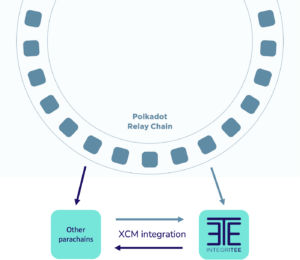
XCM Integration: What Is It and How Does It Work?
Here’s what you need to know about XCM integrations. XCM integrations are already happening all over the Polkadot & Kusama universe. But what is this acronym and what does it stand for? Here’s an explainer of what it does and why is it so important for Integritee and the ecosystem we’re in.
In layman’s terms, it can be said that XCM — cross-consensus messaging — is a universal language that enables different systems to speak to each other. It is supposed to be general enough to be widely used across growing ecosystems such as Polkadot. Even if a said system doesn’t fully comprehend the entire message, it is expected that some of those elements are “readable”.
It represents a new era of communication between parachains. Among (many) other things, Polkadot is designed to support and link projects, so it’s fair to say communication is key. These projects — parachains — are connected to the Relay Chain — Polkadot’s L0 security chain.
Kusama — Polkadot’s Canary network — follows the same structure. Integritee is one of such parachains on Kusama, and the XCM’s main function is to link parachains together so they become interoperable. These connections open up a whole new world of possibilities for Polkadot, Kusama, and its parachains in terms of functions and offers, as they enable different projects to leverage each other’s singularities.

Main advantages
There is already a high degree of communicability within the system, but the goal is to keep going and have a completely interoperable network where projects can benefit from each other’s characteristics.
XCM is very useful for networks looking for more reach and exposure. Being listed on major platforms, or having their token available on other networks are just two of the advantages. Some integrations are made for specific purposes, like enabling the use of unique technology or application from a certain network. The XCM integration between Integritee and Moonbeam has been completed. You can read about it here.
But how?
It’s important to understand that XCM is different from XCMP: the first is a language, and the latter is the messaging protocol itself, which actually allows messages to be sent between parachains. This cross-consensus messaging format enables information to be passed on from one parachain to the other through an HRMP channel. In some cases, this channel is bidirectional (between parachains), and in others, unidirectional (from a specific parachain to the other).

Integration is made once both parachains finalize all the technical steps. Some integrations on Polkadot and Kusama have already been completed, and more are expected to come, including with Integritee. These links are vital for the whole ecosystem, as it’s supposed to be interoperable and able to communicate internally.
Why don’t we just stick to the traditional messaging format?
This is still possible, but it is much more time-consuming and tiresome when compared to XCM. Different chains speak different languages, so traditional communication between parachains means a system would have to learn different languages when wanting to send the same message to several parachains.
You Might Also Like
The Potential of Tokenizing Assets: From Houses to Private Equity & Whisky
Embracing Unpredictability: The Role of Randomness in Blockchain
Uncovering Blockchain Consensus Mechanisms: Proof-of-Stake, Proof-of-Work & Beyond
Decoding CBDCs: Advantages & Challenges in the Digital Monetary Landscape
Unleashing Scalability and Speed: The Importance of Layer 2 Blockchain Solutions
Bear With Us: Blockchain Technology is Still Relevant, Even when Crypto Declines
The Imperative for Privacy in Blockchain: TEEs & Privacy-Preserving Software
How Blockchain is Benefiting Numerous Industries: From Sustainability to Brand Quality Control
KYC in Web3: How DiD is Saving the Day for Projects & Companies
Blockchain in Aerospace: Reducing Costs & Enhancing Efficiency
DAOs: How Fair can Decision-Making be and Why is Private Voting Essential?
Web3 Bounties: Rewarding Developers with Tokens
Digital Twins: Increasing Efficiency Without Compromising Privacy
AI and Blockchain: The Combo of the Future
L2 in Blockchain: TEE Sidechains vs ZK Rollups
Blockchain: Back to Basics
From Web 2.0 to Web3: A Step Forward
Here’s What You Need to Know About XCM Integration on Polkadot
How Can Integritee Help Prevent Fraud Schemes?
How Integritee combines the benefits of Web2 and Web3 technologies
A Healthier Approach to Wearables
Event Series: Learn How Integritee Is Taking Gaming to the Next Level With Ajuna
